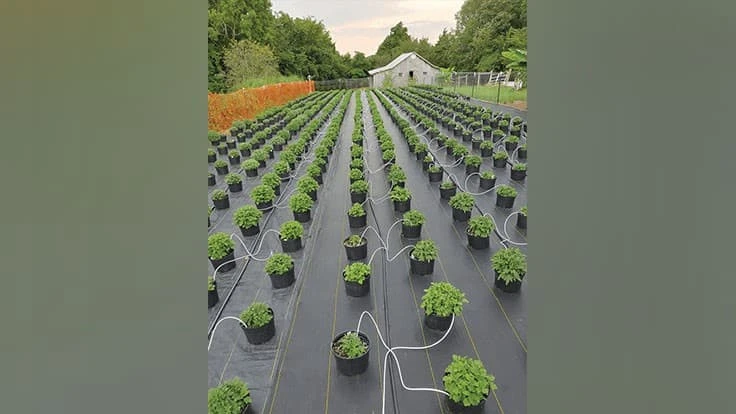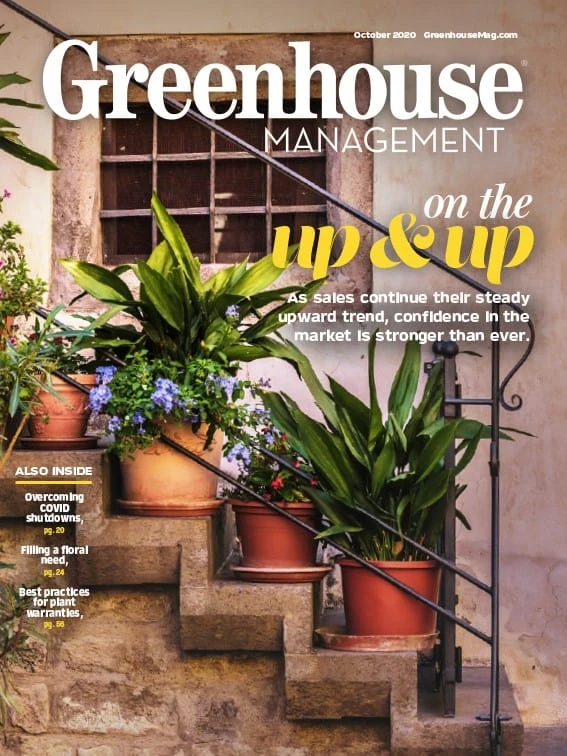

Until a few years ago, Coview Farm and Greenhouses in Cane Valley, Kentucky, was primarily a vegetable farm that sold its products at farmers markets. Now, however, the business is producing annuals and perennials to sell at farmers markets, and also at its greenhouses.
“We’ve always had flowers, but we’ve been growing more and more the last few years,” says owner Darrell Bunnell. “We’ve added another greenhouse and we’re thinking about doing another greenhouse. It’s mostly annuals, but we do we want to get more into perennials because we have demand for a few perennials. It’s something that people have asked us to grow.”
Cane Valley is almost two hours away from Louisville and Bunnell says the only massive flower retailer in the area is a local Lowe’s and a nearby Wal-Mart. With an eye on the future of the business — Bunnell is 65 and one of his daughters is likely to take over the business at some point — he wanted to do something that was both easier to manage and more lucrative.
“At my age, I can’t do the vegetables like I used to,” says Burrell, who plans to work as ‘long as he can walk.’
“We used to have 4, 5 acres of vegetables and that’s a lot more labor-intense than greenhouse work. Greenhouse work is still hard, but it’s not as bad. I’m just trying to get things set up so that when I’m gone, she can continue.”
Meeting demand amid a pandemic
Each of the past few years, Burrell says he has seen flower sales rise.
“It gets better every year,” he says. “We did really well on our spring flowers — hanging baskets and all that — and I think we could have sold a lot more. The vegetable side of it, you can always have more, but we just don’t have enough and it’s hard to do more. Even with the problems we’ve had with the virus this year, it’s still hasn’t stopped our sales a whole lot.” He estimates that sales are up at least 50%.
In Kentucky, Coview met the qualifications of an ‘essential business.’ Andy Beshear, a Democrat elected in 2019, required workers to maintain a 6-foot distance and wear a mask at essential businesses. As of Sept. 21, Kentucky has had 65,413 total cases and 1,139 deaths, according to the state government.
“The governor was pretty gung-ho about keeping the [farmers] markets and greenhouses open and going,” Burrell says. “It was kind of different to start with, but we’ve gotten used to it.”
Customer-wise, he says the only group that he’s seen less of are older customers.

“Other that, we haven’t seen a reduction in people coming in or reaching out,” he says. Petunias are the best-selling annual this year, but Burrell adds that “everyone seems crazy about any flower.”
According to Burrell, being open during the pandemic allowed Coview to continue competing with the big-box stores in the area that also stayed open. He thinks that his sales rose in part because their plants are higher quality and sold direct to consumers vs. the plants available at Lowe’s or Wal-Mart.
“Wal-Mart’s stuff is really pretty bad all the time,” he says. “Lowe’s isn’t a whole lot better, but Lowe’s has such volume and are open seven days a week.”
One key to sales success, according to Burrell: having customers pay remotely via card using Square. He says they’ve used the service at farmers markets for years.
Expansion after COVID-19
Beyond this year, Burrell says the plan is to build a storefront near the greenhouse to better display plants when customers arrive. The plan was to do so this year, but rising lumber costs meant it wasn’t feasible. For now, there will be a makeshift storefront.
“We had to get a power line in and water in too,” he adds. “So I want to get the infrastructure done first and go from there.”
Burrell says sales are a mix of customers just dropping in and reaching out via Facebook about what’s available and what they can order before it’s gone. Next year, the plan is to diversify the offerings as well.
“People come at just about any time really and that’s kind of hard because we might be out in the field working,” he says. “But it all works out.”
Overall, Burrell attributes the businesses’ growth — even during a pandemic — to Coview filling a need in its region of Kentucky. He says there are “very few” greenhouses in the area and no independent garden centers to cater to consumers. In the months and years ahead, the plan is to keep doing just that.
“We still provide a fairly decent product at a fair price,” he says. “And people are pleased. We haven’t had anyone say anything bad about anything they’ve bought from us. I think that helps too. We have a pretty good, trustworthy name. We’ve got a good name in the market from having been at farmers markets for over 20 years. I think that all helps.”

Explore the October 2020 Issue
Check out more from this issue and find your next story to read.
Latest from Greenhouse Management
- 2025 Proven Winners Horticulture Scholarship applications now open
- How to improve inventory and shipping management in the greenhouse
- Leading Women of Horticulture: Anna Ball, Ball Hort, and Terri McEnaney, Bailey Nurseries
- GM CEA HERB Part 2: A guide to increasing the sowing density of culinary herbs
- GM CEA HERB Part 1: Best practices for producing culinary herbs in controlled environments
- USDA fires experts on invasive pests, including Asian citrus psyllid, chilli thrips
- CEA Alliance celebrates bipartisan introduction of Supporting Innovation in Agriculture Act
- Dümmen Orange North America celebrating 25th anniversary in 2025





